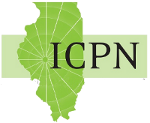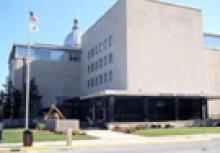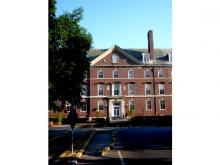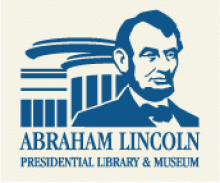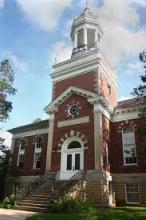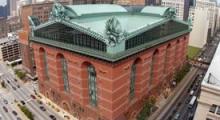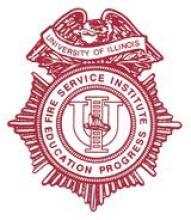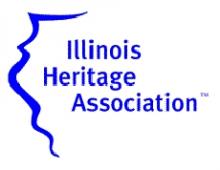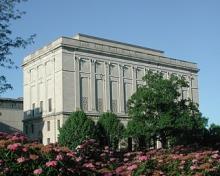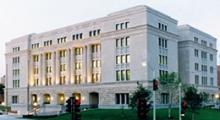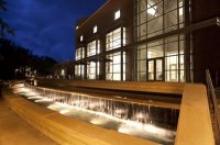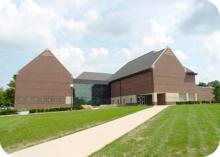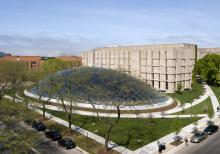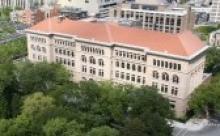ICPN Partner list
A consortium of 16 Illinois museums, libraries, archives, and preservation organizations are working together as the Illinois Collections & Preservation Network. The Illinois State Museum and the University Library at University of Illinois at Urbana-Champaign are the lead partners in this endeavor. ICPN partners are collaborating to educate; to disseminate information about collections assessment and care; to provide hands-on workshops, videos, webinars, and literature about preservation techniques; and to facilitate cooperation with first responder organizations.
Illinois State Museum
One of the two lead partners in the Illinois Collections Preservation Network, the Illinois State Museum promotes discovery, learning, and an appreciation of Illinois’ natural, cultural, and artistic heritage. The Museum’s extensive collections and research activities provide the foundation for exhibitions and public programs that tell the story of the land, life, people, and art of Illinois. The Illinois State Museum is headquartered in Springfield with branch facilities throughout the state.
The Illinois State Museum, founded in 1877, inspires the public to discover and appreciate Illinois' rich natural and cultural heritage. The Museum System is comprised of the ISM-Springfield, the headquarters; Research and Collections Center, Springfield; Dickson Mounds Museum, Lewistown; Chicago Gallery, Chicago; Lockport Gallery, Lockport; and the Southern Illinois Art & Artisans Center, Whittington. The original research and authentic collections of the Museum provide a firm foundation for innovative exhibitions, public programs, and publications that are focused on our mission and the public interest. The Illinois State Museum has been accredited by the American Alliance of Museums since 1972.
Illinois State Museum News/Press Room
University Library at University of Illinois at Urbana-Champaign
One of the two lead partners in the Illinois Collections Preservation Network, the University of Illinois at Urbana-Champaign is the proud home of one of the largest and richest public research library collections in North America. Our 24 million items, the vast majority of which are paper and book-based, include Medieval manuscripts, large collections of incunabula and early printed books, literary manuscripts, maps and atlases, prints, and all sizes and types of printed books and other paper objects. The University Library is committed to sustaining and enhancing its capacity to treat and protect its important paper-based collections, with the majority of conservation and preservation-related investments focused on the care of its rare, unique, and otherwise valuable objects.
The University Library is central to the intellectual life of the University. By providing and stewarding collections and content that comprise a current and retrospective record of human knowledge and by offering a wide array of services, it enhances the University’s activities in creating knowledge, preparing students for lives of impact, and addressing critical societal needs. The Library advances the University’s goals by ensuring unfettered access to information and by providing a network of expertise that ensures value, quality, and authenticity of information resources. The Library integrates and manages knowledge to enable learning and the creation of new knowledge.
University Library News and Events
Abraham Lincoln Presidential Library and Museum
The Abraham Lincoln Presidential Library and Museum is the premier repository for materials relating to the history of the Prairie State. The Illinois State Historical Library was created in 1889 by the Illinois General Assembly, which charged the new library with collecting and preserving "books, pamphlets, manuscripts, monographs, writings, and other materials of historical interest and useful to the historian, bearing upon the political, religious, or social history of the State of Illinois from the earliest known period of time." More than a century later the mission is continued at the new Abraham Lincoln Presidential Library. The Library is a public, non-circulating research facility that contains material on all aspects of Illinois' history. Particularly noteworthy are the Library's holdings in published resources, manuscripts, newspapers, audiovisual, and Lincolniana.
The Abraham Lincoln Presidential Library is a division of the Illinois Historic Preservation Agency. In addition to the Library, the Agency oversees state and federal preservation programs in Illinois and manages 56 state-owned historic sites and memorials.
Campbell Center for Historic Preservation Studies
The Campbell Center offers professional development coursework to meet the training needs of individuals who work in the fields of cultural resource management. The Campbell Center offers courses in collections care, historic preservation, and conservation refreshers for mid-career professionals. These courses require a varying level of expertise to attend- from basic core courses that require little previous experience, to conservation refresher courses that require mid-level professional experience. A certificate program was developed in 2005. Over the past 29 years, The Campbell Center has developed the reputation for being one of the top international destinations for collections care training. It is also well known for the expertise of its faculty.
Chicago Public Library
Since first opening its doors to the public in 1873, the Chicago Public Library has maintained its status of one of the City’s most democratic of institutions — providing all Chicagoans with a free and open place to gather, learn, connect, read and be transformed.
The more than 70 locations of the Chicago Public Library are at the forefront of providing innovative library services, technologies and tools Chicagoans need to achieve their personal goals and to establish the City’s role as a competitive force in the global marketplace. Since 1989, the City of Chicago and the Chicago Public Library have opened 59 new or renovated neighborhood libraries — unprecedented public library growth. These new libraries are that special third place — beyond home and work — where people come to improve their lives, nourish their intellect or simply to be entertained. The library is where people of all ages and backgrounds gather freely. Through its rich and current book collections, state of the art technology and cultural and public partnerships, the Chicago Public Library is a thriving, engaged leader in Chicago’s diverse neighborhoods.
Fire Service Institute at the University of Illinois at Urbana-Champaign
The Illinois Fire Service Institute is the statutory fire academy for the State of Illinois. It is operated as a continuing education and public service activity by the University of Illinois. (Reference PA 81-1147, Illinois Fire Service Institute Act, effective 7/1/1980).
The IFSI Library collection contains more than 14,000 books, videos, DVDs, films and CDs. The collection also contains periodicals, fire codes, pamphlets, standards, technical reports, legislation, and newsletters.
The IFSI Library is connected to other state and national libraries. The IFSI Library is a member of inFIRE (the International Network for Fire Information and Reference Exchange), which is a worldwide consortium of libraries with significant collections of fire literature. It is also a full member of the Lincoln Trail Libraries System (LTLS) and has a close interlibrary loan relationship with the National Emergency Training Center's Learning Resource Center. Interlibrary loan of information and materials gives you access to a wealth of information, but you have to ask.
Illinois Emergency Management Agency
The primary responsibility of the Illinois Emergency Management Agency (IEMA) is to better prepare the State of Illinois for natural, manmade or technological disasters, hazards, or acts of terrorism. Our goal is a "better prepared state." IEMA coordinates the State's disaster mitigation, preparedness, response and recovery programs and activities, functions as the State Emergency Response Commission, and maintains a 24-hour Communication Center and State Emergency Operations Center (SEOC). The SEOC acts as lead in crisis/consequence management response and operations to notify, activate, deploy and employ state resources in response to any threat or act of terrorism. IEMA assists local governments with multi-hazard emergency operations plans and maintains the Illinois Emergency Operations Plan.
IEMA maintains 8 regional offices in the State of Illinois. The location information is for their Central Office.
Illinois Heritage Association
illinoisheritage.org
The Illinois Heritage Association perpetuates the history and heritage of Illinois by providing professional services to educational institutions, local government bodies and nonprofit agencies. It recognizes the contribution of people and nature to the shaping of the cultural heritage of the state of Illinois. In furthering such such purposes, the Illinois Heritage Association researches and documents the history of Illinois, makes available the services of qualified personnel to assist with the needs of agencies entrusted with the perpetuation of Illinois history, provides educational services and benefits to the public, and builds coalitions with other groups that have similar objectives.
Illinois Heritage Association News
Illinois Humanities Council
The Illinois Humanities Council is an educational organization dedicated to fostering a culture in which the humanities are a vital part of the lives of individuals and communities. Through its programs and grants, the IHC promotes greater understanding of, appreciation for, and involvement in the humanities by all Illinoisans, regardless of their economic resources, cultural background, or geographic location. Organized as a state affiliate of the National Endowment for the Humanities in 1973, the IHC is now a private nonprofit (501 [c] 3) organization that is funded by contributions from individuals, corporations, and foundations; by the Illinois General Assembly through the Illinois Arts Council, a state agency; and by the NEH.
The IHC creates and funds numerous humanities activities throughout the state, including library discussions, seminars, lectures, performances, exhibitions, films, and written materials. Through these activities, the IHC serves as a catalyst in imaginative ventures which bring scholarship into the public forum. All our programs utilize a broad definition of the humanities -- their topics can range from history and literature to philosophy, folklore, historic preservation, archaeology, jurisprudence or comparative religion -- but all are committed to providing lifelong learning. The IHC has been at the crossroads of ideas, energizing cultural and civic life in Illinois for more than 35 years.
IHC In the News and Press Releases
Illinois State Archives
The Illinois State Archives serves by law as the depository of public records of Illinois state and local governmental agencies which possess permanent administrative, legal, or historical research values. Its collections do not include manuscript, newspaper, or other nonofficial sources. These records are made available to the public, officials, and scholars at the Norton Building and at seven regional depositories located on state university campuses throughout Illinois. The Archives provides access to them through a series of printed and electronic guides, and by in-person, mail, telephone, FAX, and Internet database reference services.
Illinois State Library
The Illinois State Library was created more than 150 years ago to serve the needs of state government. As the official library for state government, it has come a long way since 1839 when the young Secretary of State, Stephen A. Douglas, saw to it that space was reserved next to his new office for a small, fledgling library.
Today, the Illinois State Library has become a computer-age doorway to worldwide information, providing patrons with an electronic bridge to the collections of universities, public and corporate libraries, and new information systems that will continue to develop into the 21st century and beyond.
Macomb Public Library
The Library was organized on November 10, 1881 when the mayor appointed a Library Board of Directors of nine members. The first library opened on April 8, 1882 on the upper floor of the Stocker Building at 109 South Side Square.
In 1883 when the City of Macomb purchased the building at 108 South Lafayette Street, the Macomb City Library was moved to the second floor. On October 28, 1904 the Macomb City Public Library opened in a new Carnegie Building at 235 South Lafayette Street.
The Children's Library was opened to the public on June 20, 1980. A hallway and two rooms were added to connect the two buildings on July 3, 1983.
On July 1, 1992, by action of the Library Board of Trustees, Macomb City Council, and McDonough County Circuit Court Action, the Macomb City Library became the Macomb Public Library District.
Morris Library at Southern Illinois University-Carbondale
Southern Illinois University Carbondale is a public research university located in Carbondale, Illinois, United States. Founded in 1869, SIUC is the flagship campus of the Southern Illinois University system.
Morris Library is the main library for SIUC. The Library holds more than 2.6 million volumes, 3.6 million microform units, and over 36,000 current periodicals and serials. Library users have access to I-Share (the statewide automated library system) and to a comprehensive array of databases and other electronic data files. As the campus center for access to academic information and collaborative academic technology projects, Morris Library provides a wide range of services, including reference assistance, instructional and technical support, distance learning, geographic information systems (GIS), and multimedia courseware development. Morris Library is a member of the Consortium of Academic and Research Libraries in Illinois (CARLI), Association of Research Libraries (ARL), and the Greater Western Library Alliance (GWLA).
In 2009, Morris Library completed a massive renovation and expansion at a cost of $41 million. The building's original façade and the HVAC and elevator systems were completely replaced. Every floor except the basement, sixth and seventh floors of the seven-story building were completely overhauled to drastically improve accessibility and remove confusion. The remaining floors were gutted, but the renovation to those parts of the building were not completed, due to budget shortfalls and cost overruns on the construction. An additional 50,000 square feet (4,600 m2) of space was added to the north side of the library. Delyte's, a new coffee shop named after former SIU President Delyte W. Morris, now operates in a portion of the new space.
Spurlock Museum at the University of Illinois at Urbana-Champaign
With approximately 40,000 objects in its artifact collecdtion, the Spurlock Museum celebrates our shared humanity by collecting, preserving, documenting, exhibiting, and studying objects of cultural heritage. The Museum's primary function is education in service to students, scholarly communities, and the general public, interpreting the diversity of cultures through time and across the globe. Its collections constitute a public trust to be responsibly maintained for future generations as a permanent record of the cultural world.
The Spurlock Museum’s five feature galleries house exhibits representing peoples of the following cultures and geographic areas of the world: Ancient Mesopotamia, Ancient Egypt, and Africa; Ancient Greece and Rome; East Asia, Southeast Asia, and Oceania; Europe; and American Indian Cultures of North and South America. Special exhibits, based in the Campbell Gallery, serve as a springboard for unique programs, tours, and special events.
University of Chicago Library
As a center of intense intellectual inquiry, the University of Chicago Library shares with the University the aspiration to be the most dynamic learning environment in the world.
In this desired future, the Library ensures that its collections remain forward-looking, diverse in breadth and form, open to browsing, and of world-renowned quality. Through promotion, the Library makes people aware of the resources available to them, and through innovation, it makes access to these resources easier. The Library’s creation of an integrated, seamless web of information further streamlines access. To serve future users, the Library preserves information across all formats and ensures effective storage and delivery systems. The Library’s physical and virtual spaces respond to the changing habits of its users to enrich the campus experience and to multiply the ways in which people can pursue inquiry. The Library’s collaboration with expanding circles of partners yields unified access, broadening knowledge, and enhanced services.
The Library continues to embrace change and align itself to thrive on diversity, to support professional growth and opportunity, and to reward flexibility and innovation.
The Newberry, open to the public without charge, is an independent research library dedicated to the advancement and dissemination of knowledge, especially in the humanities. The Newberry acquires and preserves a broad array of special collections research materials relating to the civilizations of Europe and the Americas. It promotes and provides for their effective use, fostering research, teaching, publication, and life-long learning, as well as civic engagement. In service to its diverse community, the Newberry encourages intellectual pursuit in an atmosphere of free inquiry and sustains the highest standards of collection preservation, bibliographic access, and reader services.
The Newberry also features exhibitions, seminars, workshops, author talks, and many other programs, as well as the A.C. McClurg Bookstore.
